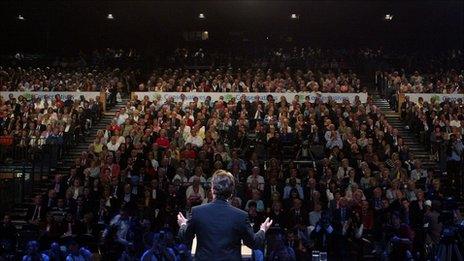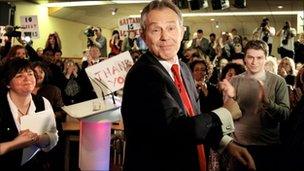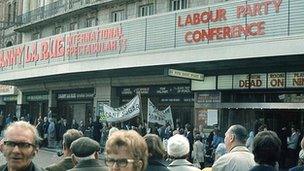Can UK political parties be saved from extinction?
- Published
- comments

Political party membership appears to be in terminal decline in the UK - so can anything be done to reverse the trend? And does it matter?
It was once a source of cultural identity and pride for millions of British people.
But at just over 1% of the population - low by European standards - party membership is fast becoming a minority pursuit.
There are more members of the Caravan Club, or the Royal Society for the Protection of Birds, than of all Britain's political parties put together.
There are many theories as to why this has happened.
The public have grown cynical and disillusioned with politicians.
We live in a more individualistic age (Why rely on political leaders to speak for you when you can do it yourself on Twitter or Facebook?).
'Oddballs'
Politics itself has become too boring and managerial - the ideological red meat loved by the "party faithful" is in short supply.
There have also been profound changes in the way Britons spend their spare time, since the days when the local Labour, Conservative or Liberal club was at the heart of the community.
"Most people don't use politics for socialising in the way they might have done in the fifties and sixties, when you had a realistic chance of meeting your future husband or wife at a party dinner or dance.
"There may be the odd exception, but that really isn't the case any more," says Jonathan Isaby, former co-editor of Conservative Home, a popular website for Tory supporters.
Even those drawn to political activism can find party politics a bit strange and off-putting, preferring instead to join one of the many single issue campaigns that now exist.
"I sometimes drag my wife along to political events but she hates going because she thinks they are all a load of oddballs," said one prominent single issue campaigner, who did not want to be named.
"Politics is conducted in a very specific way in the UK that doesn't really chime with the rest of the country."
Community action
It is not all gloom - there are still many thriving local party associations around the country.
And new parties, such as the Greens, UKIP, the SNP and Plaid Cymru, have sprung up over the years to cater to the increasingly diverse political tastes of the British public.

Trimdon Labour Club - Tony Blair's spiritual home - closed last year
But - with the exception of the SNP in Scotland - the big three Westminster parties still dominate in terms of membership and influence.
And unless they can find a way of breathing new life into their moribund structures, British democracy could soon find itself on the critical list.
Labour leader Ed Miliband has made rebuilding his party a top priority.
The membership will vote next month on a series of proposals - from discount membership fees to making local parties more "welcoming" - aimed at Refounding Labour, external.
Mr Miliband wants to transform the party into a modern, outward-looking organisation, less in thrall to a rulebook that has not changed much since the party was founded in 1918. He believes local parties should become more like community action groups - forging links with other voluntary organisations.
Labour's annual conference could be opened up to campaign groups and charities - who will be allowed to speak from the floor in debates (but not to vote on policies).
But the proposals have not gone down well with some Labour members.
They are particularly upset that members of a planned Labour "supporters network" could get the right to vote in leadership elections.
What, they argue, is the point of paying a subscription fee - which at £41 is currently the highest of the main three parties - if you do not get some privileges?
'Scary'
The Conservatives have also thrown the party open to non-members and supporters - as well as launching a more conventional recruitment drive.
"I think many find the idea of committing themselves to one party for life a bit scary," says Jonathan Isaby, who recently joined the Taxpayers Alliance pressure group as its political director.
"There are a lot of people who don't want to sign on the dotted line to join a party, but who are equally happy to help out by delivering leaflets for a particular candidate they want to support.
"And that can be just as useful as donating money, if not more so."
David Cameron's party is also trying to get members involved in policy formation, external - a process that had effectively died out - and it has pioneered the use of "open primaries" to select Tory election candidates.
The Lib Dems have also been opening up their party structures and meetings to non-members.

Are parties going the same way as variety?
Some commentators, such as Mark Pack, of the grassroots Lib Dem Voice website, believe parties need to broaden their support base in this way to avoid becoming unrepresentative of the public at large.
"There is a point at which you have to see the membership as atypical," he says.
This matters because party members can still have a big influence on government policy as well as getting to choose the party leaders and even, in certain circumstances, the prime minister.
For all their overblown rhetoric - and nothing attracts overblown rhetoric like party recruitment drives - the big parties have effectively given up on becoming mass membership organisations. There will be no return to the 1950s.
What we might be witnessing instead is the birth of a new kind of political party.
Not so much a religion to be followed by faithful, as a pastime to be pursued once or twice a year, when other commitments allow.
Not unlike the Caravan Club, in fact...
- Published25 June 2011
- Published9 March 2011
- Published7 October 2010
- Published29 March 2011